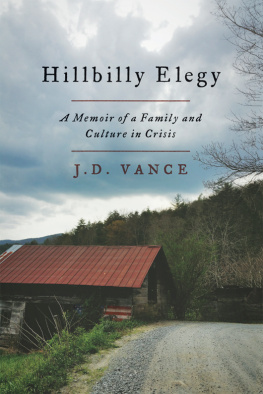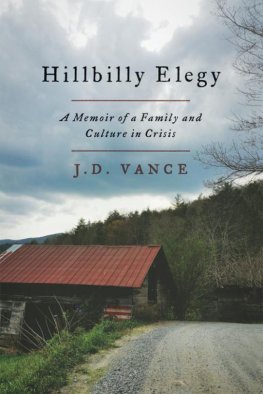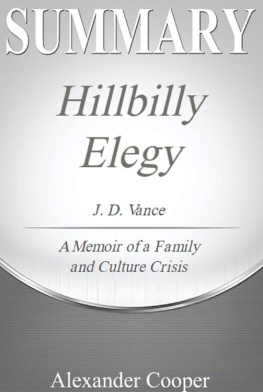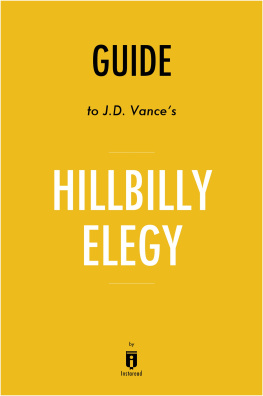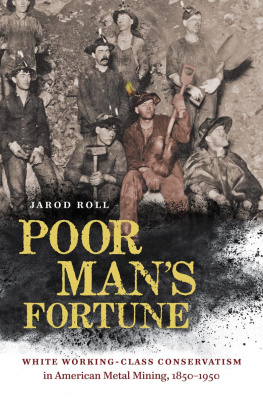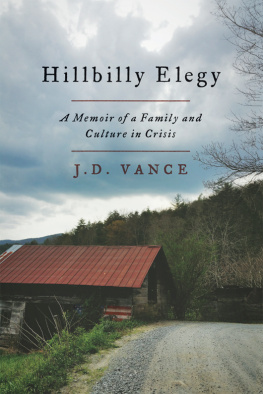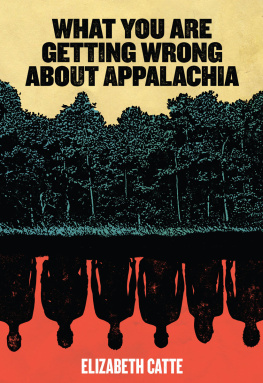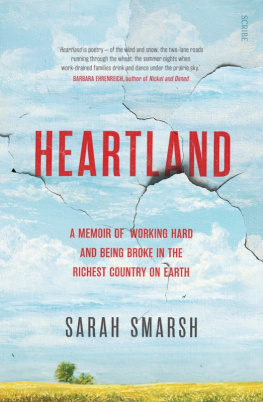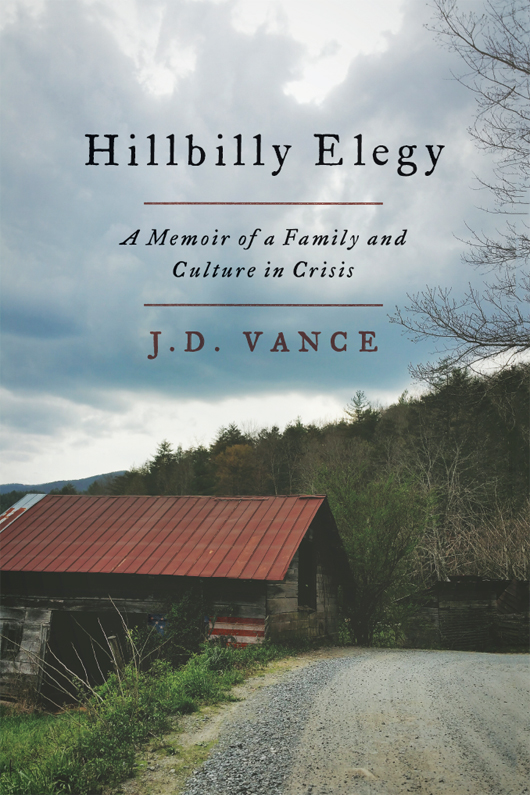My name is J.D. Vance, and I think I should start with a confession: I find the existence of the book you hold in your hands somewhat absurd. It says right there on the cover that its a memoir, but Im thirty-one years old, and Ill be the first to admit that Ive accomplished nothing great in my life, certainly nothing that would justify a complete stranger paying money to read about it. The coolest thing Ive done, at least on paper, is graduate from Yale Law School, something thirteen-year-old J.D. Vance would have considered ludicrous. But about two hundred people do the same thing every year, and trust me, you dont want to read about most of their lives. I am not a senator, a governor, or a former cabinet secretary. I havent started a billion-dollar company or a world-changing nonprofit. I have a nice job, a happy marriage, a comfortable home, and two lively dogs.
So I didnt write this book because Ive accomplished something extraordinary. I wrote this book because Ive achieved something quite ordinary, which doesnt happen to most kids who grow up like me. You see, I grew up poor, in the Rust Belt, in an Ohio steel town that has been hemorrhaging jobs and hope for as long as I can remember. I have, to put it mildly, a complex relationship with my parents, one of whom has struggled with addiction for nearly my entire life. My grandparents, neither of whom graduated from high school, raised me, and few members of even my extended family attended college. The statistics tell you that kids like me face a grim futurethat if theyre lucky, theyll manage to avoid welfare; and if theyre unlucky, theyll die of a heroin overdose, as happened to dozens in my small hometown just last year.
I was one of those kids with a grim future. I almost failed out of high school. I nearly gave in to the deep anger and resentment harbored by everyone around me. Today people look at me, at my job and my Ivy League credentials, and assume that Im some sort of genius, that only a truly extraordinary person could have made it to where I am today. With all due respect to those people, I think that theory is a load of bullshit. Whatever talents I have, I almost squandered until a handful of loving people rescued me.
That is the real story of my life, and that is why I wrote this book. I want people to know what it feels like to nearly give up on yourself and why you might do it. I want people to understand what happens in the lives of the poor and the psychological impact that spiritual and material poverty has on their children. I want people to understand the American Dream as my family and I encountered it. I want people to understand how upward mobility really feels. And I want people to understand something I learned only recently: that for those of us lucky enough to live the American Dream, the demons of the life we left behind continue to chase us.
There is an ethnic component lurking in the background of my story. In our race-conscious society, our vocabulary often extends no further than the color of someones skinblack people, Asians, white privilege. Sometimes these broad categories are useful, but to understand my story, you have to delve into the details. I may be white, but I do not identify with the WASPs of the Northeast. Instead, I identify with the millions of working-class white Americans of Scots-Irish descent who have no college degree. To these folks, poverty is the family traditiontheir ancestors were day laborers in the Southern slave economy, sharecroppers after that, coal miners after that, and machinists and millworkers during more recent times. Americans call them hillbillies, rednecks, or white trash. I call them neighbors, friends, and family.
The Scots-Irish are one of the most distinctive subgroups in America. As one observer noted, In traveling across America, the Scots-Irish have consistently blown my mind as far and away the most persistent and unchanging regional subculture in the country. Their family structures, religion and politics, and social lives all remain unchanged compared to the wholesale abandonment of tradition thats occurred nearly everywhere else. This distinctive embrace of cultural tradition comes along with many good traitsan intense sense of loyalty, a fierce dedication to family and countrybut also many bad ones. We do not like outsiders or people who are different from us, whether the difference lies in how they look, how they act, or, most important, how they talk. To understand me, you must understand that I am a Scots-Irish hillbilly at heart.
If ethnicity is one side of the coin, then geography is the other. When the first wave of Scots-Irish immigrants landed in the New World in the eighteenth century, they were deeply attracted to the Appalachian Mountains. This region is admittedly hugestretching from Alabama to Georgia in the South to Ohio to parts of New York in the Northbut the culture of Greater Appalachia is remarkably cohesive. My family, from the hills of eastern Kentucky, describe themselves as hillbillies, but Hank Williams, Jr.born in Louisiana and an Alabama residentalso identified himself as one in his rural white anthem A Country Boy Can Survive. It was Greater Appalachias political reorientation from Democrat to Republican that redefined American politics after Nixon. And it is in Greater Appalachia where the fortunes of working-class whites seem dimmest. From low social mobility to poverty to divorce and drug addiction, my home is a hub of misery.
It is unsurprising, then, that were a pessimistic bunch. What is more surprising is that, as surveys have found, working-class whites are the most pessimistic group in America. More pessimistic than Latino immigrants, many of whom suffer unthinkable poverty. More pessimistic than black Americans, whose material prospects continue to lag behind those of whites. While reality permits some degree of cynicism, the fact that hillbillies like me are more down about the future than many other groupssome of whom are clearly more destitute than we aresuggests that something else is going on.
Indeed it is. Were more socially isolated than ever, and we pass that isolation down to our children. Our religion has changedbuilt around churches heavy on emotional rhetoric but light on the kind of social support necessary to enable poor kids to do well. Many of us have dropped out of the labor force or have chosen not to relocate for better opportunities. Our men suffer from a peculiar crisis of masculinity in which some of the very traits that our culture inculcates make it difficult to succeed in a changing world.
When I mention the plight of my community, I am often met with an explanation that goes something like this: Of course the prospects for working-class whites have worsened, J.D., but youre putting the chicken before the egg. Theyre divorcing more, marrying less, and experiencing less happiness because their economic opportunities have declined. If they only had better access to jobs, other parts of their lives would improve as well.
I once held this opinion myself, and I very desperately wanted to believe it during my youth. It makes sense. Not having a job is stressful, and not having enough money to live on is even more so. As the manufacturing center of the industrial Midwest has hollowed out, the white working class has lost both its economic security and the stable home and family life that comes with it.
But experience can be a difficult teacher, and it taught me that this story of economic insecurity is, at best, incomplete. A few years ago, during the summer before I enrolled at Yale Law School, I was looking for full-time work in order to finance my move to New Haven, Connecticut. A family friend suggested that I work for him in a medium-sized floor tile distribution business near my hometown. Floor tile is extraordinarily heavy: Each piece weighs anywhere from three to six pounds, and its usually packaged in cartons of eight to twelve pieces. My primary duty was to lift the floor tile onto a shipping pallet and prepare that pallet for departure. It wasnt easy, but it paid thirteen dollars an hour and I needed the money, so I took the job and collected as many overtime shifts and extra hours as I could.

